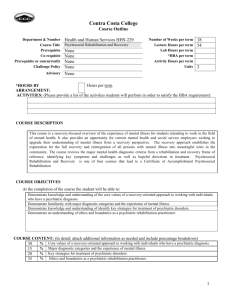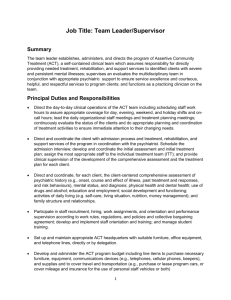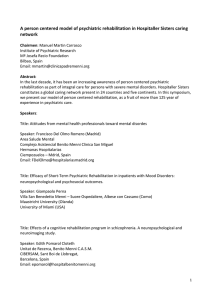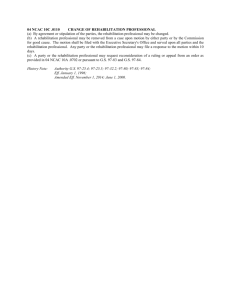THE UNIVERSITY OF NORTH
advertisement
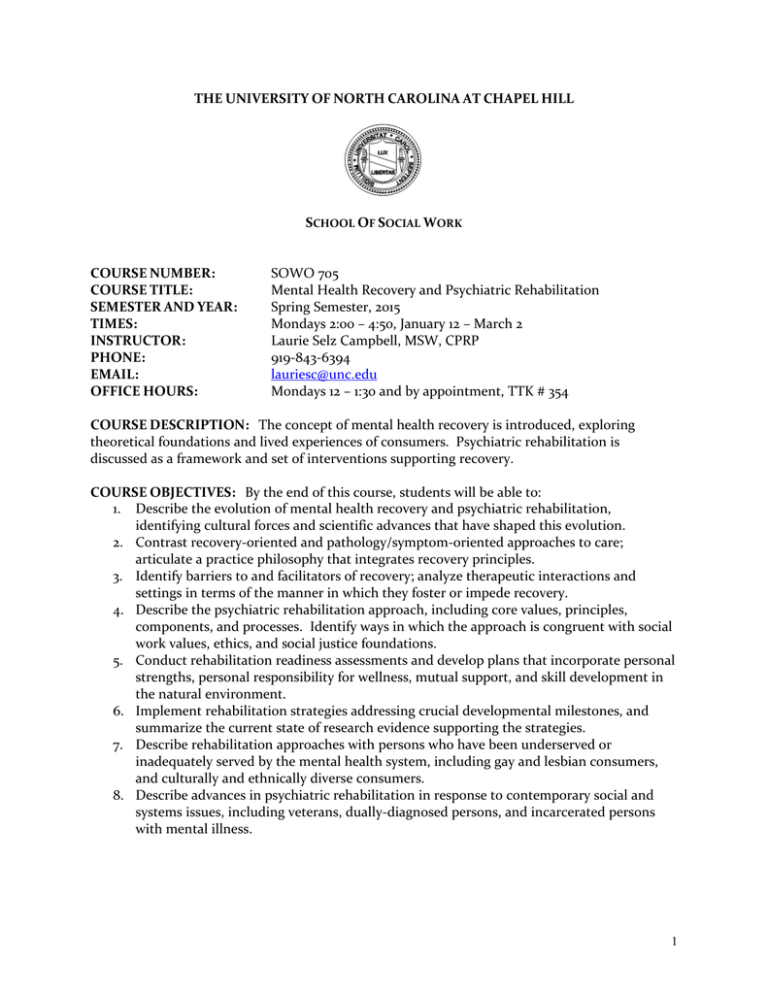
THE UNIVERSITY OF NORTH CAROLINA AT CHAPEL HILL SCHOOL OF SOCIAL WORK COURSE NUMBER: COURSE TITLE: SEMESTER AND YEAR: TIMES: INSTRUCTOR: PHONE: EMAIL: OFFICE HOURS: SOWO 705 Mental Health Recovery and Psychiatric Rehabilitation Spring Semester, 2015 Mondays 2:00 – 4:50, January 12 – March 2 Laurie Selz Campbell, MSW, CPRP 919-843-6394 lauriesc@unc.edu Mondays 12 – 1:30 and by appointment, TTK # 354 COURSE DESCRIPTION: The concept of mental health recovery is introduced, exploring theoretical foundations and lived experiences of consumers. Psychiatric rehabilitation is discussed as a framework and set of interventions supporting recovery. COURSE OBJECTIVES: By the end of this course, students will be able to: 1. Describe the evolution of mental health recovery and psychiatric rehabilitation, identifying cultural forces and scientific advances that have shaped this evolution. 2. Contrast recovery-oriented and pathology/symptom-oriented approaches to care; articulate a practice philosophy that integrates recovery principles. 3. Identify barriers to and facilitators of recovery; analyze therapeutic interactions and settings in terms of the manner in which they foster or impede recovery. 4. Describe the psychiatric rehabilitation approach, including core values, principles, components, and processes. Identify ways in which the approach is congruent with social work values, ethics, and social justice foundations. 5. Conduct rehabilitation readiness assessments and develop plans that incorporate personal strengths, personal responsibility for wellness, mutual support, and skill development in the natural environment. 6. Implement rehabilitation strategies addressing crucial developmental milestones, and summarize the current state of research evidence supporting the strategies. 7. Describe rehabilitation approaches with persons who have been underserved or inadequately served by the mental health system, including gay and lesbian consumers, and culturally and ethnically diverse consumers. 8. Describe advances in psychiatric rehabilitation in response to contemporary social and systems issues, including veterans, dually-diagnosed persons, and incarcerated persons with mental illness. 1 EXPANDED DESCRIPTION Advances in the understanding and treatment of severe and persistent mental illness encourage us to challenge long-held assumptions about the chronicity of the illness and the potential of mental health consumers to live fulfilled, contributing lives. The concept of mental health recovery and the principles of psychiatric rehabilitation are presented so that students can begin to consider how they might foster the recovery process by supporting consumers to achieve critical life milestones that were interrupted by the onset of mental illness. REQUIRED TEXT Davidson, L., Rowe, M., Tondora, J., O’Connell, M., & Lawless, M. (2008). A practical guide to recovery-oriented practice: Tools for transforming mental health care. New York, NY: Oxford University Press. Additional readings will be posted on Sakai. TEACHING METHODS I hope that we can all take part in creating a classroom culture characterized by curiosity, exploration, and openness to a variety of perspectives. I expect that we will function as colleagues with much to learn and much to teach. An integral part of the course will be the inclusion of mental health consumers as co-teachers and participants. In addition to the specific knowledge and skills described above, therefore, I hope that you will begin to experience working with mental health consumers as “partners” rather than “patients.” Throughout the course, you will be asked to reflect on the degree to which your practice embodies recovery and rehabilitation principles. ASSIGNMENTS There will be 2 assignments for the course, described here: Assignment 1: Reflection on Participatory Dialogue Due Feb. 8 After taking part in the dialogue, please write a reflection paper of about 5-6 pages. This is primarily a reflection (rather than a research) paper, so you can write in first person; however, an excellent paper will draw from, incorporate, and cite course readings on recovery. Therefore, you should use APA formatting for citations and references. Use the following questions to guide your reflection: 1. One of the purposes of the dialogue was to invite you to question your assumptions and beliefs (explicit or not) about mental illness and the people who live with it. With this in mind, please reflect on your experience during the dialogue, addressing any of the following as relevant: What were your expectations and/or feelings in anticipation of the dialogue? What were you looking forward to? Did you feel any reluctance? How was the actual experience similar to/different from what you anticipated? What, if any, moments were uncomfortable for you? Briefly describe, and consider what the roots of your discomfort might be. How did you respond? Looking back, is there anything you might you do or say differently? 2 What, if any, moments were surprising to you (in terms of challenging your own perceptions/assumptions, or an idea expressed in our readings)? Briefly describe, and reflect on the belief or assumption that was challenged. How would you compare this dialogue to your typical conversations with clients/patients/consumers? You can reflect on content (what we talked about) as well as process (power, self-disclosure, others as relevant). Feel free, also, to comment on any other important dynamics that you observed Finally, what do you think worked well in the dialogue? What, if anything, would you change? 2. Think about a specific consumer/client with whom you are working (or have worked). Identify an insight shared during the dialogue that encouraged you to think about your work with this individual in a different or new way. What was the insight? What thoughts did it prompt? What is at least one action that you might take in your work with your client as a result? 3. Finally, think about the setting in which you are working (or have worked). Considering the insights shared during the dialogue, combined with what you have learned from the readings on recovery-oriented systems and interventions, identify elements within your setting that you believe effectively support the recovery process, and conversely, those elements that may hinder it. You can consider anything that seems relevant, including structure (e.g. caseload, administrative requirements, funding streams, specific models that are mandated), and/or process (e.g. explicit or implicit beliefs about treatment and recovery, nature and quality of supervision, involvement of consumers/peers, organizational culture). What would be one small change that your agency might make to enhance its focus on recovery? Assignment 2: Rehab/Recovery Interventions for Consumers with Complex Needs Due Feb 29 For this assignment, you will choose (1) a specific subgroup of persons with SPMI, and (2) a specific life milestone or other rehabilitation/recovery focus. We will decide as a class (based on the level of shared interests) whether to complete this assignment individually or in groups. The goal of the assignment is to develop a well-reasoned intervention plan that reflects recovery principles and incorporates elements of psychiatric rehabilitation practice. Here are some examples of combinations that you might choose (though this is by no means exhaustive – feel free to follow your own interests!): Group: Veterans with SPMI Focus: Housing Group: Ex-offenders with SPMI Focus: Employment, housing Group: People with SPMI & trauma histories Focus: Personal safety, reproductive health Group: People with SPMI & addictions Focus: Wellness self-management Group: Young adults with 1st-onset SPMI Focus: Education, relationships & sexuality Group: Women (or men) with SPMI Focus: Parenting 3 Your presentation of about 30 minutes, a reference list, and a 1-page synopsis to be shared with classmates. You are free to use readings that we have completed during the course, but you should plan to include additional scholarly resources that address the specifics of your topic (and the specific questions below). Please use the following questions/sections to guide development of your presentation: 1. Help us to get to know the group you have chosen. Consider gender, age, socioeconomic status, ethnicity, lived or shared experiences, and/or other characteristics of relevance. 2. What is your rationale for choosing the milestone or rehab/recovery issue that you did for this particular group? Consider things like developmental tasks and trajectories, community inclusion, experiences of oppression and discrimination, and other relevant rationales. 3. Review the evidence regarding psychiatric rehabilitation and related interventions with this issue/group. Are there any that might be considered efficacious or promising? What questions and challenges remain? If research has not been conducted on your specific issue/group, what can be learned from the research on related populations? 4. Propose an intervention to address this issue with your chosen group, incorporating responses to the following: a. Identify the primary outcomes you would address and the services or program elements you would include b. Develop a name and/or a logo for your program that captures its focus on recovery. c. Identify one specific skill that you might want to address in your program. Why would this skill be important? Provide a brief outline of the steps you would use to assist in development of that skill. d. Identify any clinical or social justice concerns that might be of special importance (e.g. cultural responsiveness, inclusion of families, perpetuation of oppressive power relations, stigma). How might you address these? e. Finally, evaluate your proposed program in terms of ways in which it is, and in which it might not be, consistent with recovery principles, processes, and systems. If it is not entirely consistent with these, discuss some of the context or challenges that might contribute to this. GRADING SYSTEM Scores will be assigned as follows: Reflection Paper 35 points Presentation 45 points Participation 20 points Total 100 points Grades will be assigned as follows: 94 - 100 H 80 - 93 P 70 - 79 L <70 F POLICY ON INCOMPLETES AND LATE ASSIGNMENTS Assignments are due at the beginning of class on the day noted. Please notify me at least 2 days in advance if you would like to have an extension. Otherwise, I will need to deduct 5% of the assignment’s points per day (including weekends, and including the date on which the 4 assignment was due, if you submit it after the beginning of class). Incompletes may be granted if (a) there are extreme and unforeseeable circumstances that affect your ability to complete the semester’s work, and (b) we discuss in advance a plan and timeline for completing your work. POLICY ON ACADEMIC DISHONESTY: Academic dishonesty (including plagiarism, misrepresenting data, giving or receiving unauthorized assistance, and aiding another student in academic dishonesty) is contrary to the ethics of our profession, unfair to others, and will not be tolerated. All assignments must include the following signed pledge: “I have neither given nor received unauthorized aid in preparing this written work.” You should refer to the APA Style Guide, the SSW Manual, and the SSW Writing Guide for information about properly citing others’ work. POLICY ON ACCOMMODATIONS FOR STUDENTS WITH DISABILITIES: If you have a disability that affects your participation in the course and you wish to receive accommodations, you should contact the University’s Disabilities Services. They will then notify me of the documented disability, and we can meet to design the appropriate accommodations to support your learning. POLICIES ON THE USE OF ELECTRONIC DEVICES IN THE CLASSROOM: I expect that we will all be invested in creating a learning environment of respect and engagement. During class, cell phones should be turned off or transferred to voice mail. In addition, while I welcome the use of laptops in class for taking notes or completing small group tasks, I ask that you use them only for relevant activities – not for checking email or surfing the Web. I also ask that laptops be closed when we have guests in the class. Your attention is an important sign of respect to your colleagues, and an important part of your learning. 5 TOPICS & READINGS Date Week 1 Jan 11 Topics Introduction Evolution of MH recovery concept Prep for dialogue Readings Optional readings for first class: Braslow, J. T. (2013). The manufacture of recovery. Annual Review of Clinical Psychology, 9, 781-809. Provides a great overview/historical perspective on the evolution of the “recovery model” Jan 18 Jan 25 No class – Martin Luther King Day Facilitated Dialogue on Recovery with Mental Health Consumer Guests Text: Ch. 1: The Recovery Movement & Its Implications for Transforming Clinical & Rehabilitative Practice Ch. 2: A Model of Being in Recovery as a Foundation for Recovery-Oriented Practice On Sakai: Davidson, L., Sells, D., Sangster, S., & O’Connell, M. (2005). Qualitative studies of recovery: What can we learn from the person? In R.O. Ralph & P.W. Corrigan (Eds.), Recovery in mental illness: Broadening our understanding of wellness (pp. 147-170). Washington, DC: American Psychological Association. Skim for trends & themes. Feb 1 Recovery-Focused Practice & Systems Transforming practice toward a recovery orientation Recovery & EBP Looking within – stigma & our roles as professionals Text: Ch. 3: The Top 10 Concerns about Recovery Encountered in System Transformation Ch. 4: Practice Standards for Recovery Oriented Care Ch. 5: The Role of the Recovery Guide: A Recovery-Oriented Alternative to Clinical Case Management Stigma & Professional Boundary Readings: Gonzales, L., Davidoff, K. C., Nadal, K. L., & Yanos, P. T. (2014). Microaggressions experienced by persons with mental illnesses: An exploratory study. Psychiatric Rehabilitation Journal, 37, 1-8. O'Leary, P., Tsui, M., & Ruch, G. (2013). The boundaries of the social work relationship revisited: Towards a connected, inclusive and dynamic conceptualization. British Journal of Social Work, 43, 135-153. Recovery & Evidence Based Practice Readings – Choose One: Salyers, M., & Tsemberis, S. (2007). ACT & recovery: Integrating evidencebased practice & recovery orientation on assertive community treatment teams. Community Mental Health Journal, 43(6), 619-641. Stergiopoulos, V., O'Campo, P., Gozdzik, A., Jeyaratnam, J., Corneau, S., Sarang, A., & Hwang, S. (2012). Moving from rhetoric to reality: Adapting Housing First for homeless individuals with mental illness from ethno-racial groups. BMC Health Services Research, 12(1), 345-358. 6 Date Feb 8 Topics Specific Interventions Driven by Recovery Principles Psychiatric Rehab Overview Emergence, definitions, guiding principles Rehabilitation readiness assessment & planning Basics of skill training Readings Select TWO of the following interventions to research for an informal roundtable discussion: Wellness Recovery Action Planning (WRAP) Psychiatric advance directives Clubhouse model rehabilitation (Fountain House) Seeking Safety Trauma Recovery & Empowerment Model (TREM) Shared Decision Making (SDM) in mental health Peer-run crisis services Psychiatric Rehab Readings: Anthony, W. A, & Farkas, M. D. (2009). A primer on the psychiatric rehabilitation process. Boston, MA: Boston University. Please review the Preface & pages 9-15. Corrigan, P., & McCracken, S. (2005). Place first, then train: An alternative to the medical model of psychiatric rehabilitation. Social Work, 50(1), 31-39. McNamara, S. (2003). Assessing & developing readiness for rehabilitation. Recovery & Rehabilitation, 2(3), 1-4. Nemec, P. B., McNamara, S., Walsh, D. (1992). Direct skills teaching. Psychosocial Rehabilitation Journal, 16(1), 13-25. Feb 15 Rehabilitation Interventions Addressing Specific Life Milestones & Tasks Education Employment Housing Peer Support in Rehabilitation & Recovery Settings Housing, Employment, & Education Readings: Carpenter-Song, E., Hipolito, M. S., & Whitley, R. (2012). “Right here is an oasis”: How “recovery communities” contribute to recovery for people with serious mental illnesses. Psychiatric Rehabilitation Journal, 35(6), 435-440. Marino, L. A., & Dixon, L. B. (2014). An update on supported employment for people with severe mental illness. Current Opinion In Psychiatry, 27(3), 210-215. Nelson, G. (2010). Housing for people with serious mental illness: Approaches, evidence, and transformative change. Journal Of Sociology & Social Welfare, 37(4), 123-146. Rinaudo, B., & Ennals, P. (2012). Mental illness, supported education, employment and recovery: Ben's story. Work, 43(1), 99-104 Peer Support Readings: Ahmed, A., Doane, N., Mabe, P., Buckley, P., Birgenheir, D., & Goodrum, N. (2012). Peers and peer-led interventions for people with schizophrenia. Psychiatric Clinics Of North America, 35(3), 699-715 Alberta, A., Ploski, R., & Carlson, S. (2012). Addressing challenges to providing peer-based recovery support. Journal Of Behavioral Health Services & Research, 39(4), 481-491. 7 Date Feb 22 Topics Intersections with Race, Culture, Sexual Orientation Readings Readings to be split among students: Alverson, H. S., Drake, R. E., Carpenter-Song, E. A., Chu, E., Ritsema, M., & Smith, B. (2007). Ethnocultural variations in mental illness discourse: Some implications for building therapeutic alliances. Psychiatric Services, 58(12), 1541-1546. Desai, S. (2003). From pathology, to postmodernism: a debate on 'race' and mental health. Journal Of Social Work Practice, 17(1), 95. doi:10.1800/026503020073538 Daley, A. (2010). Being recognized, accepted, and affirmed: Self-disclosure of lesbian/queer sexuality within psychiatric and mental health service settings. Social Work In Mental Health, 8(4), 336-355. Ida, D. J. (2007). Cultural competency and recovery within diverse populations. Psychiatric Rehabilitation Journal, 31(1), 49-53. Mizock, L., Harrison, K., & Russinova, Z. (2014). Lesbian, gay, and transgender individuals with mental illness: Narratives of the acceptance process. Journal Of Gay & Lesbian Mental Health, 18(3), 320-341. Singh, S. P., & Burns, T. (2006). Race and mental health: there is more to race than racism. BMJ: British Medical Journal (International Edition), 333(7569), 648-651. (Included as a thought-provoking piece, not necessarily representing the opinion of your instructor!!) Feb 29 Team Presentations on Rehabilitation & Recovery Interventions for Consumers with Complex Needs 8
